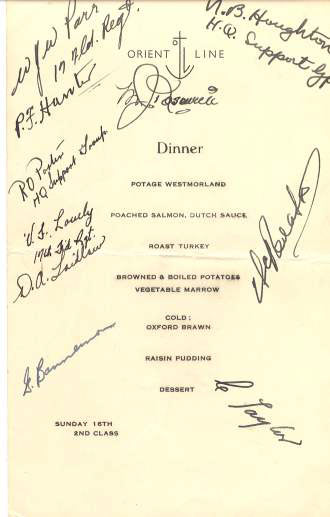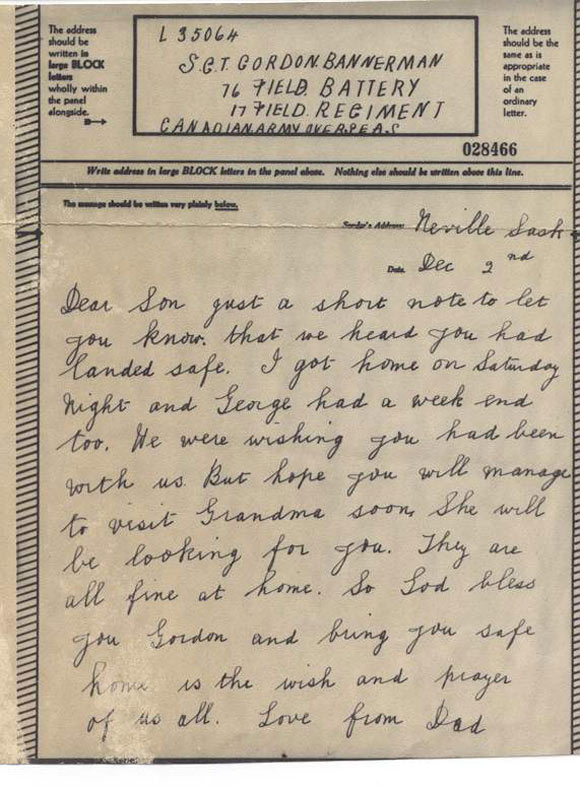Memoirs of Gordie Bannerman
Going Overseas
As fall came upon us, I had a leave granted as I had been selected for officer training and would soon proceed overseas. The family were all glad to see me and I them. It came time to leave and this time I knew I was going overseas soon. My brother George had been taking some army courses at Dundurn and Nanaimo while in the reserve, and decided to go active force with the starting rank of Sergeant, and was posted to Dundurn. Dad also joined 28th Company Veterans Guard Of Canada. So there was the three of us leaving the farm house the same day and together. I can still see my mother waving to we three until we were out of sight. My Mum was the greatest! She never saw us away with great tears, those she kept to herself and she sent us off with a smile.
Dad, George, and I arrived in Swift Current to catch the trains. George left right away to Dundurn, and Dad and I were to catch different trains the next morning early, Dad to Moose Jaw, and I on to Petawawa. The train ride east was eventful, at Winnipeg we stopped near a west bound train and here were our regimental buddies going on leave. They shouted that they were on embarkation leave and the regiment was going overseas. Here I thought I would beat them over, but this was cancelled and I was to stay and go with the regiment. Arriving back at Petawawa everything was getting prepared for the overseas move. All the men had to get leave and return, extra tetanus shots were given, and all training to be completed. Then those that did not want to go overseas somehow were able to be posted to base mess, some to training areas, some of the older and not so fit given medical discharges. It was a time of great anticipation. It is now October and the advance party left under command of Major McNeill. They sailed on the Orangi. The rest of the regiment was inspected and all loaded to go when the move was cancelled. We did leave Petawawa on 8th November, and boarded the Oronsay for overseas. The adventure had really just begun.
At last we were on our way, but first while we were all on board the troop train to take us where we did not know, but suspected it was overseas. Colonel Thackray came through all the coaches and bid us all God speed. Here was our first colonel with tears in his eyes shaking our hands and calling us by name saying all the best for us that were leaving. And giving his regrets that he was to be left behind in an administrative position. We were later to learn he was promoted to Brigadier General and was placed in charge of Petawawa Camp. We wished him well. Here we were on our way out of the country. The train rumbled through the Ontario country side and into Quebec. In Quebec City, we were detrained for a march up the cobble stone street to, I think it was called the Citadel. Our steel shod shoes striking sparks along the slippery cobble stone street. You see this was late at night and I do not remember a single person or vehicle on the street as we marched. This was a walk to get some air as being early November and the train coaches were steam heated we needed to get out for fresh air.
It seemed that the train travelled the most miles at night. After, I think, two nights on the train we arrived at Halifax, Nova Scotia. We knew we were going overseas, but where still was the question. We detrained and were given documents stating where we were to be on the ship. The ship was Oronsay. I shared a cabin with Sgt Vern Lovely, who was Sgt in the same troop as I. This is war I thought, sharing a cabin on the outside porthole and all.
We were separated from our gunners and all below. We found our chaps down in the bowels of the ship. No port holes and hammocks to sleep in that were slung above their mess tables. Before we left port the grumbling started. The conditions that our chaps had. What an ungodly mess they were placed in. It was a disaster waiting to happen. All the tremendous thousands of pounds of good food that we saw being loaded on board. Sides of beef and all the great Canadian fare. Were we to get any? Seeing this was a British ship and under their command, we had to put up with it. No we did not see any beef and not much of anything else worth eating.
The sergeants and above did pretty well, but the men were really crapped on. To show the difference Vern and I were awakened by a cabin steward at about 5 or 6 a.m. and had a glass of scalding tea put at our bunk side. The men had to go to a common kitchen and pick up their large containers and carry this across a wave and wind swept deck then down into the bowels of the boat to the rest of the fellows. Sometimes they would spill the contents, but most of the time it would be cold. Can you imagine waking up and getting out of your hammock and finding almost everyone had been sea sick and had thrown up all over the tables? If that was not bad enough, the poor ventilation, stench of those being sick and here would arrive a group of your fellow gunners carrying in breakfast. They looked and here were kippered herring with the eyes staring at them. So up it would come again. No one should have been treated that way.
The first day that we were aboard the Oronsay, we heard on the ship's radio a news report saying Ottawa was talking to Washington regarding whether we would allow USA boats and personnel into our waters. Just after this announcement, we looked over the side of the boat and here was a ship's lighter. The lighter had aboard about thirty high ranking American Naval Officers. They did not just drop from the sky, so they must have boats outside the harbour. The next day we weighed anchor and outside the harbour was an armada of American naval vessels. This impressive fleet was made up of at least three battleships and about 12 destroyers. What a terrific show of force! One of the battleships had a plane that they would catapult into the air then retrieve it by a hook and winch. The crossing was u-boat free although there was one alarm, but we did not get attacked as our convoy had almost all the division aboard. There were about twenty ships in the convoy. Of course the progress was to the speed of the slowest ship. One fell out of line and disappeared for it seemed some time, but on the following morning it was back with the flock.
At last we were on the Atlantic Ocean. For days all we could see were the American Naval escort and the grey hissing ocean. At night this great ocean sparkled by sea life in the bow wave of the Oronsay. This in itself was quite a show! It was a thrill for us as gunners to see the royal marine gun crews fire all the guns that were there for our protection. In a sense I enjoyed the voyage and was not sea sick, but the gunners lot was pretty grim, and the crossing was not any pleasure for them. You were not allowed to throw anything overboard as u-boats might pick up the items and follow the convoy. You did not smoke on deck at night and all the ships were blacked out.
In the main lounge someone pulled back the cushion and here there was a great amount of machine gun bullet holes. On questioning the crew about this they said, “about fifteen Australians on the previous trip of the Oronsay, while being transported from Tobruk, came under attack by enemy aircraft. The soldiers had gone to this large window to look out. One of the attacking aircraft sprayed the Oronsay with cannon and machine gun fire killing a large number of the troops at the window.” We were told to stay well away from windows if we were attacked. The evidence of splintered wood behind the cushions was enough for us to remember the warning. The stains of blood were still evident.
This massive armada of American war ships was soon to leave us. About a day out of Britain, the fleet swung away from us and only three Allied destroyers shepherded us the rest of the crossing, which was another day. Soon we sailed up the Mersey River to Liverpool. All along the sail into Liverpool the masts of sunken ships marked the channel. These sunken ships were the result of enemy action. We knew we were in a war zone. Soon we were tied to the dock. Here all the dockworkers were out in force welcoming us to Liverpool. We were told there was a shortage of a lot of things in Britain and cigarettes were in short supply. Our fellows having a few cigarettes started to throw them over to these chaps who of course seeing they had a good thing encouraged our chaps to throw more. Now it was not too long when our fellows wished they had not been as generous as it was quite some time before they were to get cigarettes from home.
I happened to be duty Sergeant that day and along with the RSM who was duty officer, we were standing watching the throwing of cigarettes and the banter between dock worker and our chaps. Bill Briant was a very vocal fellow and talked a mile a minute. A seagull flew over and shit right in Bill’s mouth. Well Bill spit and swore for the longest time and did not repeat a single cuss word for it seemed moments. The RSM Murray was quite serious, but he really cracked up with laughter.
We marched off the ship the next day and boarded a small train (compared to our large trains in Canada), destination not known, as we sped across the English countryside. All the time we were watching for any sign of bomb damage. In the dead of night we arrived in Aldershott, a large military camp and town that had been built almost a hundred years before. Our advance party had been in England for a short while and out of the darkness came the voice of Bombardier John Amyotte calling for 76 Battery to follow him. We marched up Gun Hill and soon found out we would be in Waterloo West barrack block.
More Training in England- Date modified:



